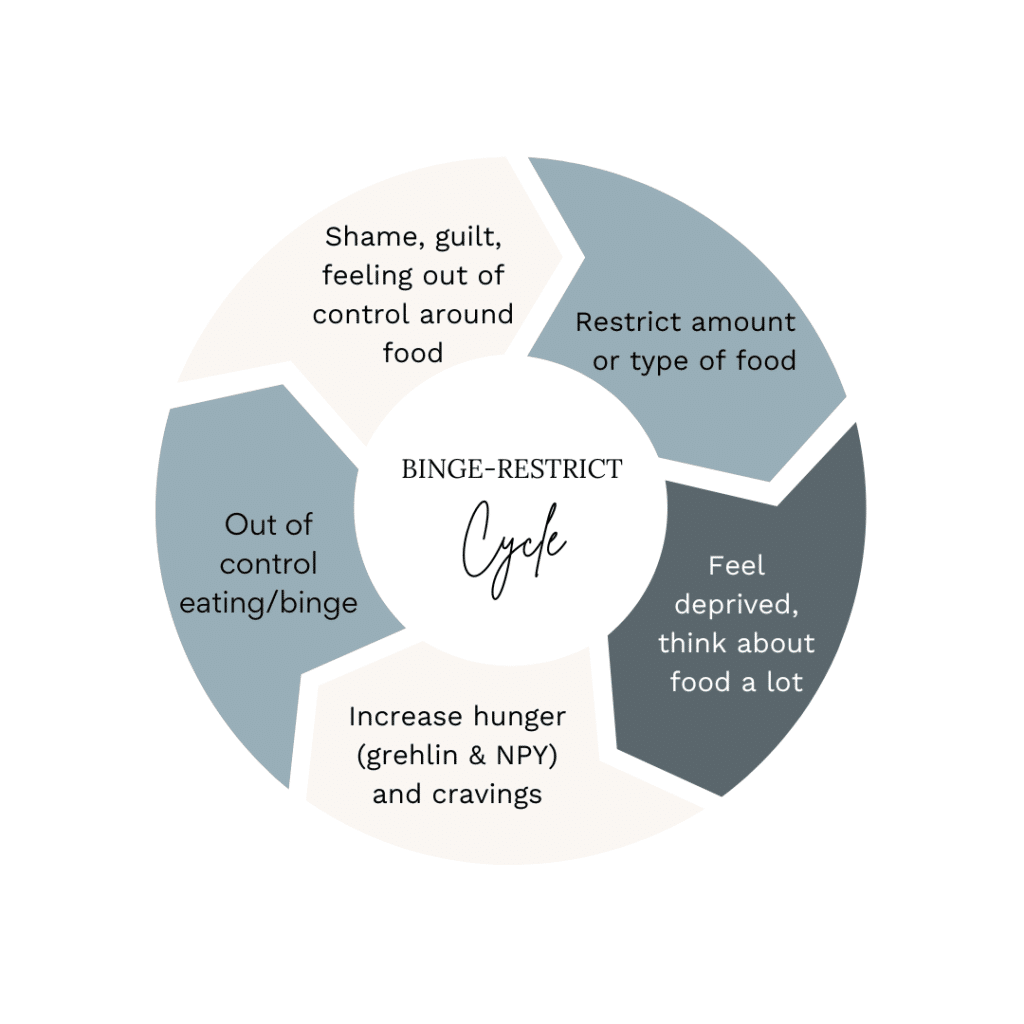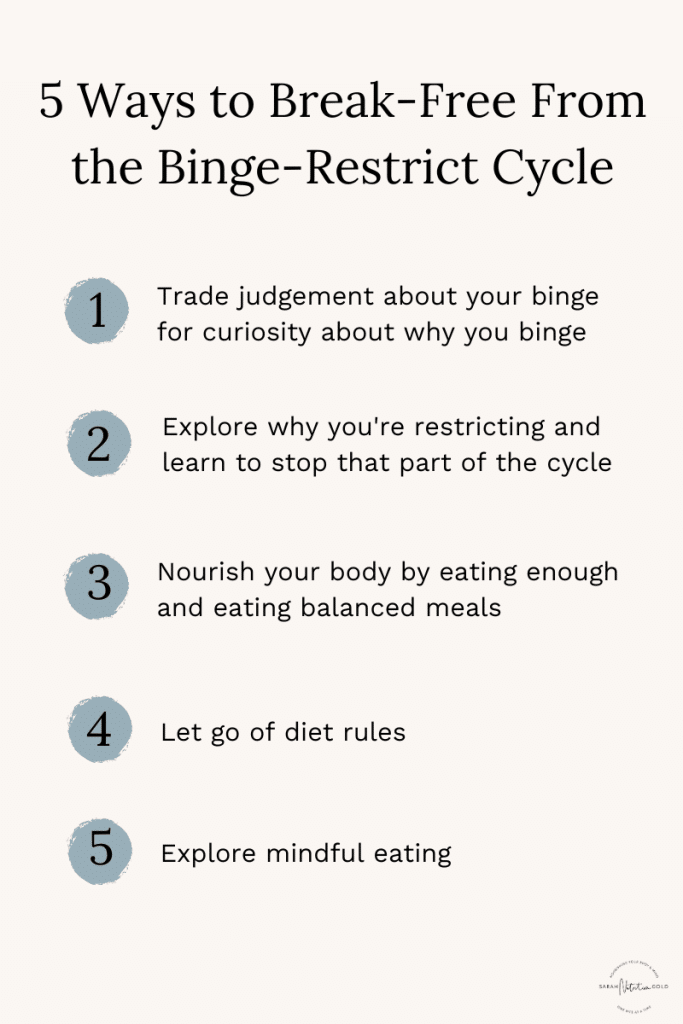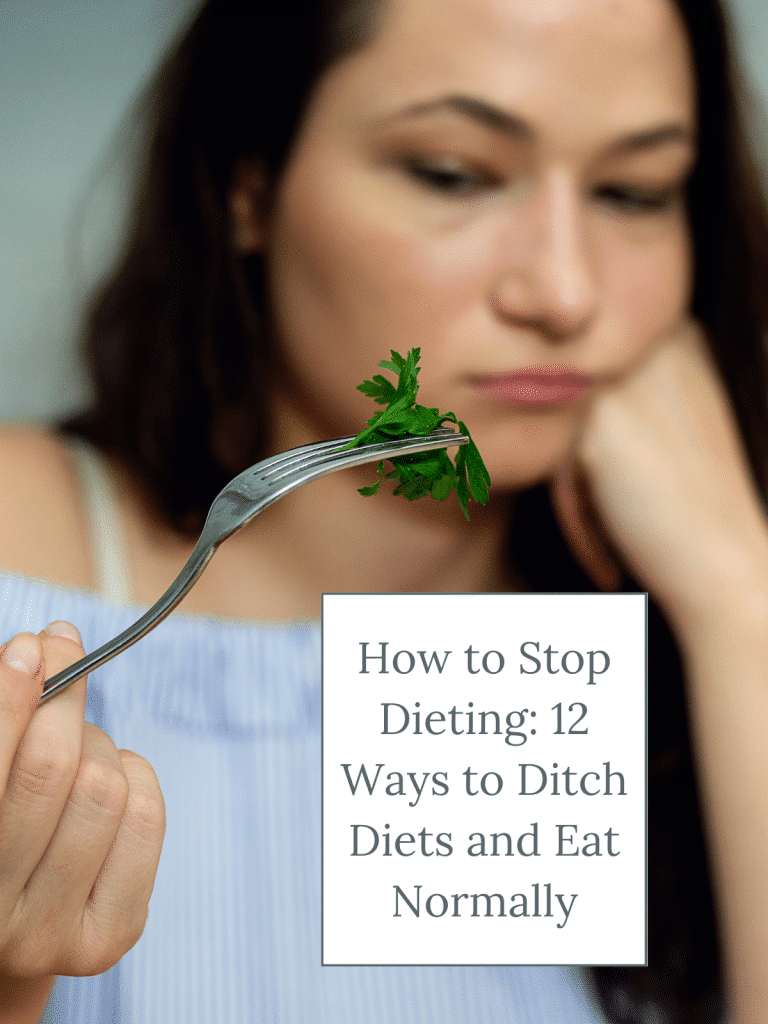5 Ways to Break Free from the Binge-Restrict Cycle
Binging or eating more than feels comfortable can cause a lot of stress and shame. For many people, the natural response is to try to “fix” it by restricting their food intake the next day. But restriction can actually make the desire to binge stronger and feeds the binge-restrict cycle.
Read on to learn what the binge-restrict cycle is, why restriction keeps you stuck in the cycle, and tips for breaking free from the binge-restrict cycle for good.
Please note that this article does not address binge eating disorder. While “binge” has a clinical definition, for the purpose of this article, “binge” can mean any kind of overeating, eating in a way that feels out of control, or eating past what feels comfortable.
If you suspect you may have binge eating disorder, you deserve support. Visit the NEDA website to search for an eating disorder provider in your area.
What is the Binge-Restrict Cycle?
The binge-restrict cycle starts when you restrict your food intake. Think back to the last time you dieted or restricted certain foods or overall intake. Did you end up breaking your diet and eating a lot of some of the foods that were off limits while you were on the diet?
You might have even said to yourself, “well, the diet will start again tomorrow.”
If you did, you’re not alone. This is a common cycle among dieters. In fact, restriction is one of the top predictors of a binge. And most people respond to a binge by restricting because they believe it will “fix” the problem. But it only perpetuates the cycle (oh, the irony).
What is a Binge?
According to the DSM-5 (a set of criteria used for diagnosing mental illnesses including eating disorders), a binge eating episode is defined as eating a large amount of food during a specific time period and feeling a lack of control over eating.
A binge can also include:
- Eating faster than normal.
- Eating until you feel uncomfortably full.
- Eating large amounts of food when you’re not actually hungry.
- Eating alone because you’re ashamed of how much you’re eating.
- Feeling disgusted and guilty after overeating.
But overeating does not need to qualify as a “binge” to feel distressing. Eating more than feels comfortable or experiencing out-of-control eating can feel just as bad, even if it doesn’t qualify as “binge eating.” And can keep you in the cycle.
Stages of the Binge-Restrict Cycle
The binge-restrict cycle has five stages. You can enter the cycle anywhere.

Stage 1: Shame, guilt, and feeling out of control
Many things can trigger feelings of shame and guilt. Both of these feelings may be a result of eating something you feel like you shouldn’t or because you ate more than you think you should. This can make you feel like you’re out of control.
Stage 2: Restriction
Restriction is a common response to feeling badly about your body or feeling out of control around food. Restriction can include reducing portions (common among calorie counters), skipping meals, or cutting out certain foods.
You may also find yourself mentally restricting foods. With mental restriction, you may allow yourself to eat certain foods but feel like you shouldn’t. For example, you might eat pasta for dinner but still categorize that as a “bad” food and feel like it’s something you need to make up for.
Just like physical restriction, mental restriction can produce feelings of shame, guilt, and loss of control around food.
The restriction phase can last anywhere from days or weeks to over a year. You may even feel a sense of pride or be motivated by your ability to control your eating at this stage.
Stage 3: Deprivation
Deprivation is what eventually happens when you restrict your intake. For many people, it can involve feeling tired or low energy and being preoccupied with food. You may wish you could allow yourself to eat those off limits foods or feel jealous of people who do.
You may find yourself obsessively browsing recipes online or skipping social activities because you don’t feel like you can “control” yourself when you’re out. Even if you don’t skip the event, you’ll worry and obsess about the food the whole time.
If you find that you’re preoccupied with food, check out our article about how to stop thinking about food all the time.
Stage 4: Intense cravings
This is where restriction really starts to take a toll. You feel like you’re constantly fighting the urge to eat. Whether that’s just eat more in general or a specific food that’s been off limits. You may find it difficult to focus because you’re consumed with thoughts about food.
You might also notice that no matter what you eat, you don’t feel satisfied and can’t stop thinking about your next meal.
Stage 5: Overeating/binging
Eventually, the restriction and cravings become too much to handle, and you give in.
The primal part of your brain takes over, and you find yourself eating in an out-of-control way. Somehow, the cookies make it into the house and are calling your name. And you can’t ignore it.
When you eventually give in, it probably feels really impulsive. It may even feel like emotional eating. You likely eat past fullness or in a way that doesn’t feel good in your body.
When this happens, you tell yourself (and truly believe) that this is the last time you will eat any of these “off-limits” foods. Because you believe you’ll never eat them again, you eat large amounts so that you can have them one last time or to just get them out of the house.
Once you stop eating, you’re flooded with feelings of shame and guilt, and the binge-restrict cycle starts over.
Why You Binge
To understand why you binge, you need to know about the hunger hormones ghrelin and neuropeptide Y (NPY).
Ghrelin is a hormone that causes you to feel hungry. When you eat enough, ghrelin production is suppressed until it’s time for your next meal. When it’s time to eat again, ghrelin is released and tells your brain to seek out food.
However, when you’re restricting how much you eat, ghrelin is continually released, leading to constant hunger. Just think back to the last time you were trying to cut calories or skipped a meal.
Were you thinking about food a lot? Thinking about food is actually a sign of hunger.
And ghrelin isn’t the only hormone that causes you to feel hungry or want food. NPY is a hormone that is released between meals. It also increases the desire to eat, especially foods rich in carbohydrates.
Here’s the thing: your body has evolved to survive, and it can’t tell the difference between a diet and actual starvation. In caveman days, ignoring hunger could mean death.
When hunger hormones are constantly released because you’re not eating enough, the caveman brain turns on. This causes you to eat faster and crave foods that provide quick energy and/or a lot of calories. This is why you crave things with sugar and fat in them.
And that’s exactly why you all of a sudden find yourself eating a tub of ice cream without even realizing it. It’s not because you don’t have enough willpower.
It’s not just physical restriction that can lead to binging. Mental restriction can also lead to a preoccupation with food, which could increase the urge to binge.
Dieting and the Binge-Restrict Cycle
Dieting is inherently restrictive and can be the reason you’re the binge-restrict cycle. Think about the last time you went on a diet. You probably cut back on your portions, stopped eating certain types of food, skipped meals, or had rules about what kind of foods you were allowed to eat.
Cutting calories and foods is a form of restriction, which leads to the release of hunger hormones. This causes you to feel hungry and crave energy-dense or carb heavy foods like cookies, chips, pasta, and pizza.
And that’s not all. The mental restriction with dieting can lead to an obsession with food. If you can’t stop thinking about food, you are more tempted to eat more of it and feel out of control around it.
Overall, one thing is pretty clear. While you may try to restrict your intake after a binge to make up for eating more than you meant to, this only makes you feel more hungry and experience more cravings, leading to the next binge.
5 Ways to Break Free from the Binge-Restrict Cycle
If you’re stuck in the binge-restrict cycle, you may feel like it’s impossible to break free from it. But it is possible to stop.

Trade Judgment for Curiosity
Do you ever judge yourself for what you’ve eaten? Maybe you feel like a failure or like you lack willpower. You might feel like you are out of control and there’s something wrong with you.
There’s nothing wrong with you. Restriction is a predictor of binging. And this self-judgment only causes the binge-restrict cycle to continue because guilt and shame can lead to restriction.
Instead of judging yourself for a binge, get curious about why it happened. Were you having a bad day and using food to soothe yourself? Or were you hungry because you’d been restricting your intake?
By getting curious about the driving forces behind a binge, you’ll be able to understand why it happened, and only then can you change your behavior in the future.
Explore Why You’re Restricting
One of the best ways to break the binge-restrict cycle is to stop restricting. But given the messages about weight and health surrounding us, this is easier said than done.
To stop restricting, it’s important to understand why you’re doing it in the first place. For many people, restriction is driven by diet culture. We’re surrounded by messages telling us we must shrink ourselves to be worthy.
Once you understand why you’re restricting, you can work to dismantle those beliefs. This part of breaking free from the binge-restrict cycle is so important that it makes up much of the “U” in our UNDIET method that we use to help women like you live their lives without dieting.
Nourish Your Body
Your body needs energy to function properly. If you’re restricting your intake, either by reducing portion sizes or eliminating certain macronutrients (like carbohydrates), you won’t get the nutrition you need and will likely experience cravings later in the day.
To ensure your body is getting the fuel it needs, try to eat something every three to four hours. If there are more than four hours between your main meals, add a balanced snack.
It’s also important to include a balance of all three macronutrients (carbohydrates, protein, and fat) at each meal. You might think it’s helpful to avoid certain carbs or fat, but that could be what’s perpetuating the cycle.
Let Go of Dieting Rules
Until you give yourself full permission to eat all foods, you’ll stay stuck in the binge-restrict cycle. This is because by making certain foods off limits (or labeling them as “bad”), you’re giving them all the power. You’ll be more likely to gravitate toward them when you’re hungry or stressed.
The key to breaking free from the binge-restrict cycle is making peace with food and letting go of diet rules. Read more about how to break free from the food rules that keep you stuck in the binge-restrict cycle.
Explore Mindful Eating
Do you ever sit down to eat a meal only to spend the entire meal looking at your phone or watching TV? If so, you might not be getting as much satisfaction from the meal as you could.
Mindful eating helps you get more from the food experience and connect with your body to know when you’ve had enough to eat.
Try putting away the technology and instead engaging all your senses as you eat. Notice how the food smells, tastes, and feels in your mouth. By paying more attention to your food, you’ll get more satisfaction from the meal, which could help prevent future binges.
If nighttime is a struggle, you’re not alone
If you struggle with binge eating and overeating, nighttime is probably a particularly tough time for you. Many people find they can ‘keep it together’ during the day and then it all falls apart at night.
If that’s you, there’s nothing wrong with you, and the strategies outlined in this article will help alleviate this. You may want to read Why You Binge at Night Plus Proven Tips to Stop to understand why nighttime feels extra hard.
Final Thoughts
Breaking free from the binge-restrict cycle isn’t easy, but it is possible. By ditching dieting and instead giving yourself full permission to eat all foods, you’ll take away the power that certain foods once had over you.
Ready to finally put an end to the binge-restrict cycle? Get started with our free training “How to Feel in Control Around All Foods (without diets or willpower).”







3 Comments